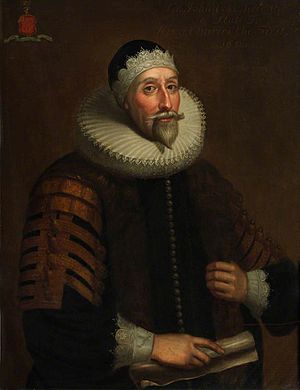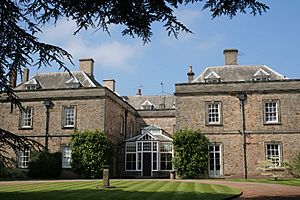John Coke facts for kids
Quick facts for kids
Sir John Coke
|
|
|---|---|

Sir John Coke c. 1639
|
|
| Secretary of State | |
| In office September 1625 – January 1640 |
|
| Member of Parliament for Cambridge University |
|
| In office February 1626 – March 1629 |
|
| Lord Privy Seal | |
| In office 1625–1628 |
|
| Member of Parliament for St Germans |
|
| In office 1624–1625 |
|
| Master of Requests | |
| In office November 1622 – 1625 |
|
| Member of Parliament for Warwick |
|
| In office January 1621 – January 1622 |
|
| Personal details | |
| Born | 5 March 1563 Trusley, Derbyshire |
| Died | 8 September 1644 (aged 81) Tottenham, Middlesex |
| Nationality | English |
| Spouses | (1) Mary Powell (1604–1624) (her death) (2) Joan Lee (1624–his death) |
| Children | Joseph (ca.1605–1624); John (1607–1650); Thomas (1610–1656); Ann (1617–1686); |
| Alma mater | Trinity College, Cambridge |
| Occupation | Civil servant and politician |
Sir John Coke (born March 5, 1563 – died September 8, 1644) was an important English government worker and politician. He was like the "Samuel Pepys of his time," meaning he was very good at keeping records and managing things.
Sir John was a MP (a person elected to help make laws) for different areas between 1621 and 1629. He also served as a Secretary of State for King Charles I. This was a very important job, especially during the "Personal Rule" from 1629 to 1640, when the King ruled without Parliament.
He got his start thanks to powerful people like Fulke Greville, 1st Baron Brooke and George Villiers, 1st Duke of Buckingham. They liked how efficient and hardworking he was. King Charles I noticed him and made him Secretary of State in 1625. His job was to help the King carry out his plans for the country.
Even though one famous writer, Edward Hyde, 1st Earl of Clarendon, said he wasn't very lively, Sir John Coke kept his important job until he was 77 years old. He was dismissed in January 1640.
When the First English Civil War started in 1642, his family was divided. His older son, John, supported Parliament, while his younger son, Thomas, joined the Royalists (who supported the King). Sir John was too old to fight. His home, Melbourne Hall, was taken over by Parliament's soldiers. He moved to Tottenham and died there in 1644.
Contents
Sir John Coke's Early Life and Family
John Coke was born in Trusley, Derbyshire, on March 5, 1563. He was the second son of Richard Coke, a well-known lawyer. John had at least three other brothers and sisters. His older brother, Francis, inherited the family lands. His brother, George Coke, later became a Bishop of Hereford (a church leader).
Sir John Coke was married twice. His first wife was Mary Powell, whom he married in 1604. They had six children who lived, including:
- Joseph (born around 1605)
- John (born 1607)
- Thomas (born 1610)
- Ann (born 1617)
A Career in Government
John Coke likely went to Westminster School. Then, in 1576, he went to Trinity College, Cambridge. He stayed there for 15 years, even teaching rhetoric (the art of speaking and writing well) from 1584 to 1591.
During his time at Cambridge, he met people connected to Robert Devereux, 2nd Earl of Essex. He started working for Fulke Greville, 1st Baron Brooke, helping him with money matters. In 1591, he left Cambridge to work for Greville full-time.
From 1593 to 1597, he traveled around Europe. He was probably working for the Earl of Essex, who wanted to build a network of helpers there.
Working for the King
In 1621, John Coke was elected as an MP for Warwick. In 1622, he became a Master of Requests. This job involved handling petitions and requests made to the King. He was made a knight in 1624, which meant he was given the title "Sir."
He was elected MP for St Germans in 1624 and again in 1625. In 1625, he started working as a Secretary of State. In Parliament, he would ask for money for the King. He also defended the King's plans for other countries and the actions of King Charles I and Buckingham.
His official appointment as Secretary of State was in September 1625. He was also elected MP for Cambridge University in 1626 and 1628. Some members of Parliament didn't like him. His speeches didn't always help the King's standing with Parliament.
King Charles I ruled without Parliament from 1628 onwards. Sir John Coke's hard work was very useful to the King during this time. He kept his job until 1640. After being dismissed, he moved to his estate, Melbourne Hall, in Melbourne, which he had bought in 1628.
He died at his house in Tottenham, near London, on September 8, 1644.
Sir John Coke's Legacy
In his younger years, Sir John Coke strongly believed in the King's absolute power. He also really disliked the Pope and the Catholic Church.
Edward Hyde, 1st Earl of Clarendon described him as "a man of very quiet education and a narrower mind." He also said that Coke's best quality was his hard work, and his biggest weakness was being greedy.
As mentioned, Sir John Coke's two sons took different sides in the English Civil War. His older son, Sir John Coke, supported Parliament. His younger son, Thomas Coke, was a Royalist who supported the King.
The Coke family owned Melbourne Hall for many years. However, the family name was eventually lost when the last male heir, George Lewis Coke, died without children in 1777. His sister married the family's lawyer.
 | Janet Taylor Pickett |
 | Synthia Saint James |
 | Howardena Pindell |
 | Faith Ringgold |


